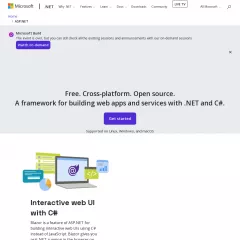Microsoft ASP.NET 
Microsoft ASP.NET is used by 8.22% of sites
Official Website
https://www.asp.netCategory
Web Frameworks
ASP.NET is a web application framework developed by Microsoft that allows developers to build dynamic and interactive web applications. It is part of the larger .NET framework and provides a wide range of tools, libraries, and functionalities for creating robust and scalable web applications.
Key features and characteristics of ASP.NET include:
Server-Side Web Development: ASP.NET enables server-side web development, where the processing of web requests and generation of HTML content occurs on the server. This approach allows for the separation of presentation and business logic, enhancing maintainability and code organization.
Model-View-Controller (MVC) Architecture: ASP.NET MVC is a popular architectural pattern that provides a structured way of building web applications. It separates the application into three main components: models (data and business logic), views (presentation layer), and controllers (handling user requests and orchestrating the flow).
Web Forms: ASP.NET Web Forms is another approach for building web applications that provides a rich set of server controls and event-driven programming model. It simplifies the development process by abstracting much of the HTML and JavaScript code, allowing developers to focus on the application's functionality.
Razor Pages: Introduced in ASP.NET Core, Razor Pages is a lightweight and simpler alternative to the MVC pattern. It allows developers to create web pages that combine server-side code and HTML markup using the Razor syntax, resulting in clean and readable code.
Language Support: ASP.NET supports multiple programming languages, including C# (pronounced "C sharp"), VB.NET (Visual Basic .NET), and F# (F sharp). Developers can choose the language that best suits their preferences and expertise.
Extensive Library and Framework Support: ASP.NET provides a vast set of libraries and frameworks that facilitate common web development tasks. This includes data access libraries (Entity Framework), authentication and authorization frameworks (ASP.NET Identity), caching mechanisms, and more.
Integration with the .NET Ecosystem: ASP.NET seamlessly integrates with other components of the .NET framework, allowing developers to leverage its extensive capabilities. This includes access to a wide range of class libraries, APIs, and tools for tasks like data manipulation, security, networking, and more.
Cross-Platform Development: With the introduction of ASP.NET Core, Microsoft expanded the framework to support cross-platform development. ASP.NET Core applications can run on different operating systems, including Windows, macOS, and Linux, giving developers more flexibility in deployment options.
Developer Productivity: ASP.NET provides a range of features that enhance developer productivity, such as automatic compilation, built-in debugging, drag-and-drop controls, rich tooling in integrated development environments (IDEs) like Visual Studio, and extensive documentation and community support.
ASP.NET has been widely adopted for building enterprise-level web applications, e-commerce platforms, content management systems (CMS), and various other types of web solutions. Its combination of powerful features, flexibility, and integration with Microsoft technologies makes it a popular choice among developers for creating robust and scalable web applications.
Key features and characteristics of ASP.NET include:
Server-Side Web Development: ASP.NET enables server-side web development, where the processing of web requests and generation of HTML content occurs on the server. This approach allows for the separation of presentation and business logic, enhancing maintainability and code organization.
Model-View-Controller (MVC) Architecture: ASP.NET MVC is a popular architectural pattern that provides a structured way of building web applications. It separates the application into three main components: models (data and business logic), views (presentation layer), and controllers (handling user requests and orchestrating the flow).
Web Forms: ASP.NET Web Forms is another approach for building web applications that provides a rich set of server controls and event-driven programming model. It simplifies the development process by abstracting much of the HTML and JavaScript code, allowing developers to focus on the application's functionality.
Razor Pages: Introduced in ASP.NET Core, Razor Pages is a lightweight and simpler alternative to the MVC pattern. It allows developers to create web pages that combine server-side code and HTML markup using the Razor syntax, resulting in clean and readable code.
Language Support: ASP.NET supports multiple programming languages, including C# (pronounced "C sharp"), VB.NET (Visual Basic .NET), and F# (F sharp). Developers can choose the language that best suits their preferences and expertise.
Extensive Library and Framework Support: ASP.NET provides a vast set of libraries and frameworks that facilitate common web development tasks. This includes data access libraries (Entity Framework), authentication and authorization frameworks (ASP.NET Identity), caching mechanisms, and more.
Integration with the .NET Ecosystem: ASP.NET seamlessly integrates with other components of the .NET framework, allowing developers to leverage its extensive capabilities. This includes access to a wide range of class libraries, APIs, and tools for tasks like data manipulation, security, networking, and more.
Cross-Platform Development: With the introduction of ASP.NET Core, Microsoft expanded the framework to support cross-platform development. ASP.NET Core applications can run on different operating systems, including Windows, macOS, and Linux, giving developers more flexibility in deployment options.
Developer Productivity: ASP.NET provides a range of features that enhance developer productivity, such as automatic compilation, built-in debugging, drag-and-drop controls, rich tooling in integrated development environments (IDEs) like Visual Studio, and extensive documentation and community support.
ASP.NET has been widely adopted for building enterprise-level web applications, e-commerce platforms, content management systems (CMS), and various other types of web solutions. Its combination of powerful features, flexibility, and integration with Microsoft technologies makes it a popular choice among developers for creating robust and scalable web applications.